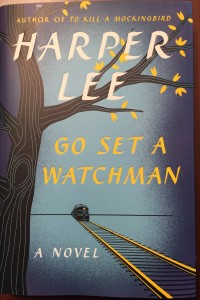I have finished reading Harper Lee’s newly released novel Go Set a Watchman and am collecting my thoughts. I read it slowly, taking copious notes. Probably like most people, I tried to read it in two mutually exclusive ways simultaneously: both with and without To Kill a Mockingbird as a touchstone. Figuring out how to evaluate it most fairly is indeed a conundrum.

While still working on my own discussion of the book, I offer you a compendium of articles that I began assembling a day or two before the publication date of Watchman, July 14. I have not read most of these pieces because I want to come to my own conclusions first.
I’m sure that there are spoilers galore in many of these articles, so I leave it up to you to decide whether to tackle these pieces before you read the novel for yourself or to wait until later.
I don’t claim that this list is exhaustive. I’m sure there are many other articles out there, but these are the ones that I’ve come across.
Early Reviews Hype ‘Watchman’ Interest
Publishers Weekly comments on early reviews of Go Set a Watchman, including those in the New York Times, Washington Post, and The Guardian. Includes links.
‘Watchman’ Anticipation, in Photos
From Publishers Weekly:
From midnight release parties, to film screenings, to daylong read-a-thons, check out our photos of how bookstores around the country rang in the on-sale date of Harper Lee’s Go Set a Watchman, the biggest publishing event of the year.
While Some Are Shocked by ‘Go Set a Watchman,’ Others Find Nuance in a Bigoted Atticus Finch
The revelation will probably alter readers’ views of “Mockingbird,” a beloved book that has sold more than 40 million copies globally and has become a staple of high school curriculums. It could also reshape Ms. Lee’s legacy, which until now has hinged entirely on the outsize success of her only novel, published 55 years ago.
Go Set A Watchman by Harper Lee: EW Review
Entertainment Weekly gives the novel a grade of D+. And most of the commenters seem to agree.
A New Account of ‘Watchman’s’ Origin and Hints of a Third Book
Tonja B. Carter, Harper Lee’s attorney, is changing her story.
Harper Lee may have written a third novel, lawyer suggests
More as the plot continues to thicken:
Harper Lee’s lawyer Tonja Carter, the woman at the centre of the mysteries surrounding Go Set a Watchman’s publication this week, has broken her silence. In a lengthy piece in the Wall Street Journal, she intimates that there may be a third novel by Lee residing in a safe-deposit box in her home town of Monroeville, Alabama.
The lawyer, the lock box and the lost novel: Harper Lee book mystery widens
Harper Lee’s lawyer, who negotiated the deal over this week’s controversial launch of Go Set a Watchman, was allegedly far more intricately involved in searching for the manuscript years ago than previously disclosed, the Guardian has been told.
The Invisible Hand Behind Harper Lee’s ‘To Kill a Mockingbird’
The story of how Therese von Hohoff Torrey — known professionally as Tay Hohoff — guided Harper Lee through a two-year revision process that eventually turned Lee’s original manuscript into To Kill a Mockingbird.
As ‘Watchman’ Hits Stands, Authors Reflect on ’To Kill a Mockingbird’
Several writers reflect for Publishers Weekly on how To Kill a Mockingbird “affected everything from their ideas about race and humanity to their choice of profession.”
The Suspicious Story Behind Harper Lee’s ’Go Set a Watchman’
From the New Republic:
This piece is the first in a three-part series we’ll be publishing this week on Harper Lee, To Kill a Mockingbird, and Lee’s new novel, Go Set a Watchman.
Why I’ll Wait to Read GO SET A WATCHMAN
This post is part of our Harper Lee Reading Day: a celebration of one of the most surprising literary events of our lifetime, the publication of her new book, Go Set a Watchman.
On this page you’ll find a link to other entries in this series on Bookriot.
In this piece Jessica Tripler describes her hesitancy to jump into the new book because “I personally question whether Lee is capable of consenting to or understanding what is going on.”
What Critics Are Saying About Go Set a Watchman
This article itself is a compendium, with excerpts from major reactions to the novel from sources including the New York Times, The Guardian, and NPR.
6 Fascinating Facts About the Life & Literature of Harper Lee
From biography.com
Teachers’ New Homework: a ‘Watchman’ Plan
From the Wall Street Journal, a consideration of how teachers must revamp their lesson plans about To Kill a Mockingbird in light of Go Set a Watchman.
How Should Schools Deal With the New ‘Atticus Finch’?
From the New York Times, a good companion piece to the Wall Street Journal article:
Fans of Harper Lee’s “To Kill a Mockingbird” — a book widely read by students in the United States — are reeling from the revelations that a beloved character, Atticus Finch, is portrayed as a racist in Lee’s recently released second novel, “Go Set a Watchman.”
For many teachers, this presents a conundrum in how the fictional character is taught in classrooms. How will the new book affect or change the way “To Kill a Mockingbird” is taught in middle and high school English classes?
This is the introductory page that links to discussions written by several people.
‘My Atticus’
Megan Garber for The Atlantic:
Go Set a Watchman is a threat not just to readers’ heroic idea of Atticus Finch, but also to the many, many children who have been named in his honor.
Could Harper Lee have written four books?
In an op-ed this week in The Wall Street Journal, Lee’s attorney, Tonja Carter, hinted at a third, as-yet-unpublished novel. And a friend of the author, who is also a professor of history at Auburn University in Alabama, spoke to CNN about a possible fourth book.
This possible fourth book is supposedly a nonfiction study of Rev. Willie Maxwell, who was suspected in the deaths of various relatives.
Mockingbirds, watchmen, and novelists: on Harper Lee and novel-writing
Amy Weldon, a native of Alabama, a fiction writer, and a professor of English at Luther College in Iowa, discusses the writing process by looking at Watchman as an early draft of Mockingbird.
Now We Can Finally Say Goodbye to the White Savior Myth of Atticus
An opinion piece by Osamudia R. James, professor of law at the University of Miami, where she writes and teaches about education, race and the law, and identity.
The literary crimes of Go Set a Watchman
This [Atticus Finch] is a perfectly acceptable hero, living and breathing in the kind of fictional world that many people, including myself, prefer. The problem is that Lee can’t have it both ways. Mockingbird is on a different literary plane than Watchman, and the two can only meet awkwardly, which is precisely what HarperCollins has demonstrated by grafting Watchman onto Mockingbird. They cannot work together in any meaningful sense; one cannot cast a new light on the other, except in the way an apple sheds light on an orange by being, well, different.

